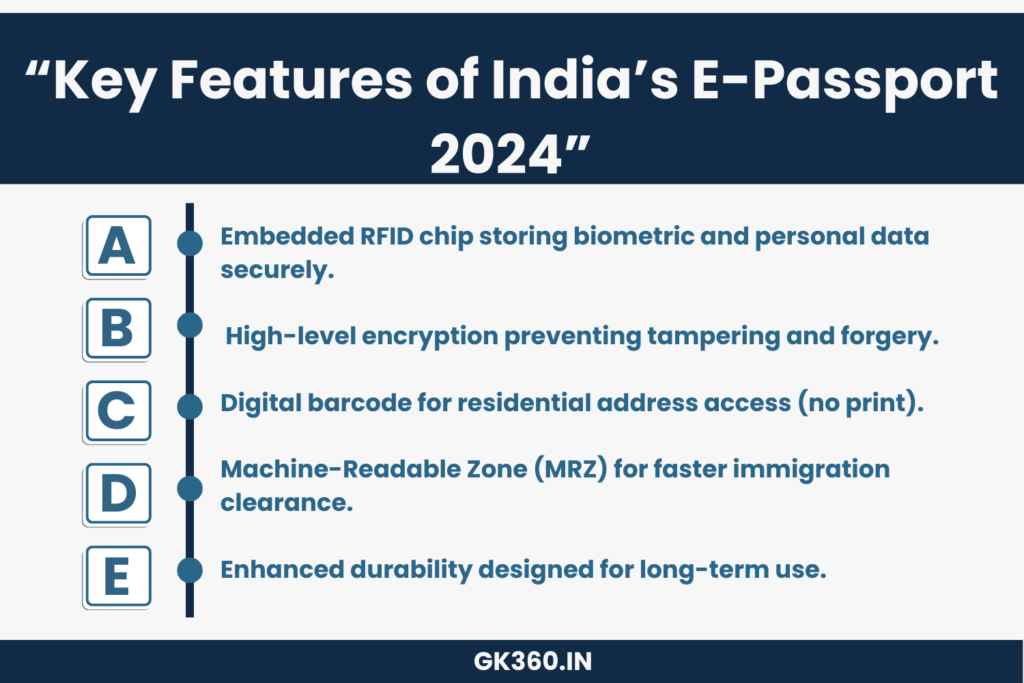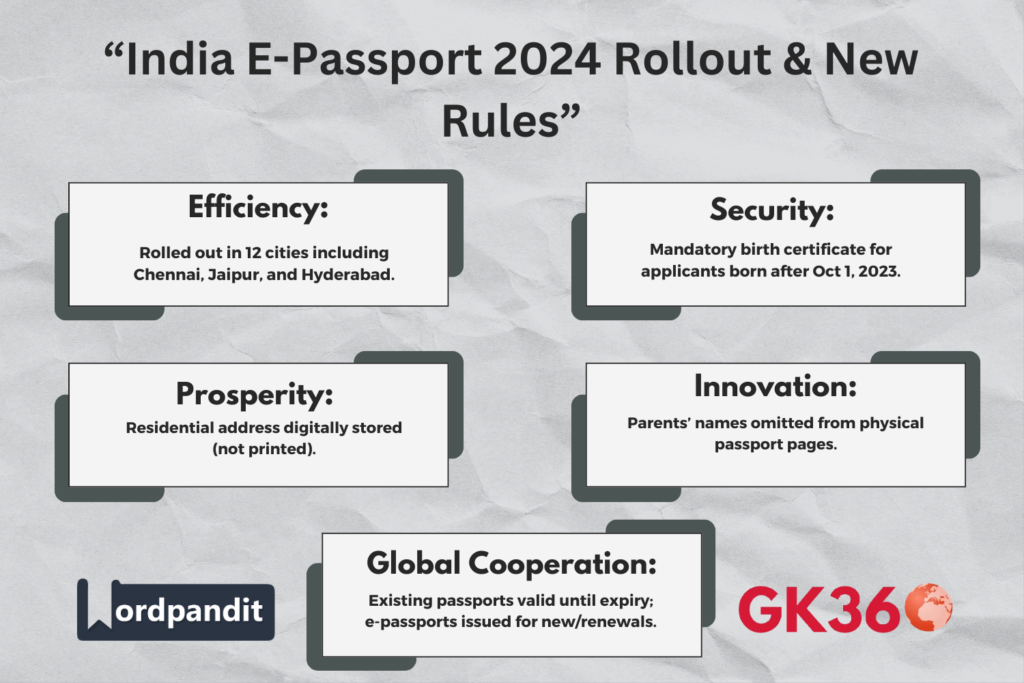India E-Passport 2024: Features, Rollout Cities, and New Rules Explained
Introduction
India has officially entered the era of digital travel documentation with the launch of its chip-based e-passport, marking a historic leap in modernizing its passport infrastructure. Rolled out under the Passport Seva Programme Version 2.0, the India e-passport 2024 integrates cutting-edge security features, biometric data storage, and global compatibility standards—aligning India with leading nations like the U.S., U.K., and Germany.
This initiative is a vital step toward secure, paperless, and contactless international travel, part of India’s broader Digital India mission to digitize public services. Whether you’re a frequent traveler or preparing for your first international trip, understanding the benefits, rollout timeline, and new passport rules is essential.

Table of Contents
- What is India’s Chip-Based E-Passport?
- Key Features of India’s E-Passport
- Why Did India Introduce the E-Passport?
- E-Passport Rollout: Timeline and Cities Covered
- New Indian Passport Rules Effective 2025
- Benefits of the E-Passport for Indian Travelers
- FAQs About India’s E-Passport
- Conclusion: The Road Ahead for Digital Travel Documents
What is India’s Chip-Based E-Passport?
The chip-based e-passport is a next-generation travel document embedded with a secure Radio Frequency Identification (RFID) chip and antenna that digitally stores the holder’s personal and biometric information. The data includes the passport holder’s name, date of birth, passport number, and facial image—encrypted and protected from tampering or unauthorized access.
This passport conforms to ICAO (International Civil Aviation Organization) standards, ensuring global interoperability and faster processing at immigration counters worldwide.
Key Features of India’s E-Passport
The India e-passport 2024 introduces multiple advancements designed to enhance both security and convenience for travelers. Here’s what makes it stand out:
- Embedded RFID Chip & Antenna: Stores personal and biometric data securely within the passport.
- High-Level Encryption: Protects data against cloning, forgery, and tampering.
- Digital Scannable Barcode: Allows authorized officials to access the holder’s residential address without printing it on the passport.
- Machine-Readable Zones (MRZ): Enables faster scanning at immigration gates, reducing manual processing time.
- Enhanced Durability: Designed to withstand wear and tear for its validity period.
With these features, the e-passport improves not only security but also streamlines cross-border verification processes.
Why Did India Introduce the E-Passport?
The rollout of India’s e-passport is part of a strategic vision under the Digital India initiative to modernize government services and align with international travel protocols. The key objectives driving this move include:
- Enhancing Security Standards: By storing encrypted biometric data, the passport minimizes risks of identity theft and document fraud.
- Facilitating Global Interoperability: Ensures that Indian passports are compatible with global immigration systems for seamless verification.
- Streamlining Immigration Checks: Reduces manual verification errors, speeds up clearance times, and improves passenger experience.
- Supporting Paperless Governance: Demonstrates India’s commitment to digitization and sustainability in public administration.
In addition to improving security, the e-passport represents India’s efforts to future-proof its travel documentation against evolving global security challenges.
E-Passport Rollout: Timeline and Cities Covered
The Indian government has adopted a phased rollout strategy, starting with select Regional Passport Offices (RPOs) on April 1, 2024. In the initial phase, the following cities are issuing chip-based e-passports:
- Chennai
- Jaipur
- Hyderabad
- Nagpur
- Amritsar
- Goa
- Raipur
- Surat
- Ranchi
- Bhubaneswar
- Jammu
- Shimla
More cities and passport offices will be added as infrastructure upgrades are completed nationwide. This gradual expansion ensures quality control and smooth implementation across the country.
New Indian Passport Rules Effective 2025
Starting in 2025, several key passport rules under Passport Seva Programme Version 2.0 will be enforced to complement the e-passport rollout:
- Mandatory Birth Certificate Submission: Anyone born on or after October 1, 2023 must submit a birth certificate to apply for a passport.
- Residential Address Stored Digitally: The holder’s address will be digitally embedded in the RFID chip—it will no longer appear printed on the passport’s last page.
- Parents’ Names Omitted: In a step toward data privacy and simplification, parents’ names will not be printed in the passport’s physical pages.
These changes aim to simplify passport design, enhance privacy protections, and align with international data management standards.
Benefits of the E-Passport for Indian Travelers
The launch of India’s chip-based e-passport offers a host of benefits that transform the travel experience for Indian citizens:
- Increased Security: The encrypted RFID chip makes it nearly impossible to forge or tamper with, reducing the risk of identity theft or document fraud.
- Faster Immigration Processing: Machine-readable data and biometric authentication speed up clearance at both domestic and international immigration counters.
- Global Recognition: The e-passport meets ICAO global standards, ensuring seamless acceptance and compatibility at international airports worldwide.
- Contactless Verification: Enables contactless scanning at immigration kiosks, aligning with post-pandemic global health protocols.
- Data Privacy Enhancement: Sensitive information like residential address and parents’ names are no longer printed, reducing exposure of personal data while traveling.
- Supports Digital India Vision: The e-passport exemplifies India’s progress toward digital governance and paperless public services.
Whether traveling for business, education, or tourism, Indian citizens will benefit from greater convenience, reduced wait times, and enhanced data protection.

FAQs About India’s E-Passport
- How do I apply for an Indian e-passport?
You can apply through the official Passport Seva website or authorized passport seva kendras. The process remains similar to a standard passport application, with biometric data collected at the center. - Is the e-passport mandatory for new applicants?
Currently, the e-passport is being rolled out in phases. While it is available at select Regional Passport Offices (RPOs), it will gradually replace regular passports across India. - What data is stored in the RFID chip?
The chip securely stores your biometric data (facial image), personal information (name, date of birth, passport number), and digitally embedded residential address—all encrypted for security. - Will my current passport remain valid?
Yes. Existing passports remain valid until expiry; e-passports will be issued during new applications or renewals at eligible passport offices. - Which countries already use chip-based passports?
Countries like the United States, United Kingdom, Germany, Japan, and Australia have been using e-passports for years. India’s rollout places it among these technologically advanced nations.
Conclusion: The Road Ahead for Digital Travel Documents
The introduction of India’s chip-based e-passport under the Passport Seva Programme Version 2.0 is a landmark achievement, signifying India’s shift toward secure, efficient, and globally aligned travel documentation.
With features like an embedded RFID chip, digitally stored address, and biometric encryption, the e-passport delivers enhanced security, privacy, and faster immigration processing for millions of Indian travelers.
As the government expands the rollout to more cities and implements the new passport rules from 2025, Indian citizens can expect a smarter, safer, and more seamless international travel experience.
| Aspect | Details |
| Purpose | Introduce secure, globally compatible digital passports under Passport Seva 2.0. |
| Key Features | RFID chip, encryption, barcode, MRZ, enhanced durability. |
| Rollout Cities (Phase 1) | Chennai, Jaipur, Hyderabad, Nagpur, Amritsar, Goa, Raipur, Surat, Ranchi, Bhubaneswar, Jammu, Shimla. |
| New Rules (Effective 2025) | Mandatory birth certificate (born after Oct 1, 2023); digital address storage; parental names omitted. |
| Benefits | Improved security, faster immigration, global recognition, contactless processing. |
| Application Process | Similar to standard passport via Passport Seva portal & centers; biometric data required. |
| International Alignment | Meets ICAO standards; aligns India with U.S., U.K., Germany for global interoperability. |





